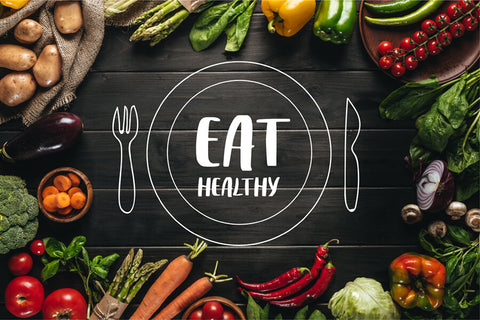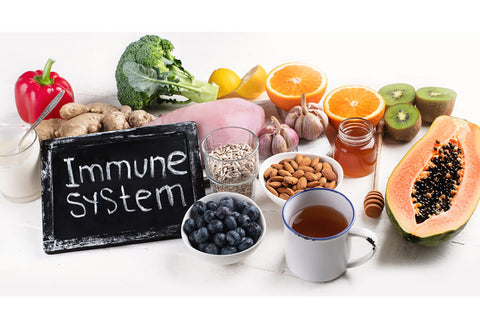Nutrition Month is an annual event in March that promotes the importance of making informed food choices and developing healthy eating and physical activity habits. Whether you're looking to lose weight, gain muscle, or just maintain a healthy lifestyle, we've got the tips you need to become a healthier version of yourself.
In general, eating right means limiting unhealthy processed and fast foods, as well as added sugar, salt, and saturated and trans fats. It includes eating a variety of foods from all the food groups, including fruits, vegetables, whole grains, lean proteins, low-fat dairy, and healthy fats.
Overview of Eating Right for Nutrition Month
Eating right is about making healthier food choices, understanding nutrition labels, and adding more fruits and vegetables to your meals. The goal of Nutrition Month is to help individuals become more aware of their dietary habits and make changes that will lead to healthier, more nutritious meals.
This celebration helps bring awareness to the importance of eating a healthy and balanced diet, which is essential to maintaining physical and mental health. It can also help to promote healthy habits, such as eating more fruits and vegetables, controlling portion sizes, and limiting junk food.
Additionally, it can help support healthier communities by educating people on the importance of eating nutritious foods. A nutritious diet is essential for good health, not only during Nutrition Month but also throughout our lives.

The Benefits of Eating Right
Consuming a balanced and nutritious diet of whole foods such as fruits, vegetables, whole grains, proteins, and healthy fats can help you get the nutrients your body needs while avoiding processed and refined foods that are often high in unhealthy ingredients.
A nutritious diet can improve your energy levels, boost your immune system, and help you maintain a healthy weight. Eating right can also help reduce inflammation, which can lead to a variety of health problems, including heart disease, diabetes, and cancer.
It helps improve your physical health.
Eating right can improve your overall physical health, especially if you integrate it with some physical activities. It can provide you with the essential nutrients your body needs to function properly, such as vitamins, minerals, carbohydrates, protein, and healthy fats.
It helps improve your mental health.
A healthy diet can help improve your mental health, allowing you to have a better mood, reduce stress and anxiety, and increase your overall sense of wellbeing. A diet rich in nutrients such as omega-3 fatty acids, vitamins B12 and D, and folate, can help reduce symptoms of depression and enhance cognitive function.
It's important to note that while diet and nutrition play a role in mental health, they are not the only factors, and seeking help from a mental health professional is important to address other mental health issues.
It helps increase your energy.
Eating the right foods helps you maintain a steady supply of energy throughout the day. Foods that are high in carbohydrates, protein, and healthy fats can provide the body with the energy it needs to function properly. Consuming a diet that is rich in vitamins and minerals, such as iron, B vitamins, and magnesium, can help improve energy levels and prevent fatigue.
It helps improve your digestion.
Consuming the right foods helps your body absorb the nutrients it needs, improving digestion and reducing the risk of digestive issues such as constipation, diarrhea, and bloating. Foods that are high in fiber, such as whole grains, fruits, and vegetables, can help regulate bowel movements and prevent constipation.
Probiotic-rich foods, such as yogurt, kefir, and fermented vegetables, can also help improve gut health and aid digestion. Keep in mind that it is recommended to eat in moderation. Eating smaller, more frequent meals can help prevent overeating and reduce the strain on your digestive system.

It helps strengthen your immune system.
Eating a variety of healthy foods helps boost your immune system, reducing your risk of illness and infection. These nutrients can provide your body with vitamins, minerals, and antioxidants to fight off disease and infection.
A healthy diet can also reduce inflammation, which can help keep the immune system functioning optimally. Additionally, eating a diet low in added sugar and processed foods can help reduce the risk of developing chronic diseases, which can weaken your immune system.
It helps you maintain a healthy weight.
Eating a balanced diet may also help to maintain a healthy weight and reduce the risk of obesity and its associated diseases. Consuming nutritious foods, such as fruits, vegetables, whole grains, and lean protein, can help you feel fuller for longer and reduce overall calorie intake.
Foods that are high in fiber can help regulate digestion and prevent overeating. Additionally, maintaining a healthy weight through proper nutrition and regular exercise can also improve self-esteem and body image, which can have a positive impact on mental well-being.
It helps reduce the risk of nutrient deficiency.
Eating right helps reduce the risk of nutrient deficiency by providing the body with essential vitamins and minerals that it needs to function properly. Consuming a balanced diet with a variety of fruits, vegetables, proteins, dairy, and whole grains can help ensure that the body is getting the nutrients it needs.
Foods with vitamins and minerals such as calcium, iron, and vitamin D can also help prevent nutrient deficiency. Additionally, taking a daily multivitamin can help provide additional vitamins and minerals for the body.
It helps improve your skin's health.
Eating the right foods can help improve the appearance and condition of your skin. A diet rich in fresh fruits and vegetables, whole grains, lean proteins, and healthy fats can help keep your skin hydrated, nourished, and glowing. Also, drinking enough water can help improve skin hydration and prevent dry, dull skin.
Consuming foods that are high in vitamin A and healthy fats can help improve skin health and reduce the appearance of fine lines and wrinkles. Antioxidant-rich foods, such as berries, tomatoes, and dark leafy greens, can help protect your skin from environmental damage. Eating foods high in omega-3 fatty acids, such as salmon and walnuts, can help reduce inflammation and improve skin elasticity and moisture.
Maintaining a balanced diet and avoiding processed foods, sugar, and saturated fat can help maintain the health of your skin and prevent skin-related ailments. By incorporating these dietary principles into your daily routine, you can help maintain a healthy and radiant complexion and reduce the risk of skin problems.
Simple Tips to Eating Right
To help you achieve your goal of eating right for Nutrition Month, here are a few key tips you can try to improve your health.
- Learn more about nutrition by reading nutrition labels and understanding what you’re putting into your body.
- Filling half your plate with fruits and vegetables is a great way to get a variety of vitamins, minerals, and fiber.
- Choose whole grains such as oats, quinoa, brown rice, and buckwheat as they are good sources of protein, vitamins, and minerals.
- Include lean proteins such as lean meats, eggs, fish, beans, and nuts that are important for maintaining muscle mass and keeping you feeling full.
- Added sugars are found in many processed and packaged foods. Try to limit added sugars in your diet and opt for naturally sweet foods like fruits.
- Choose healthy fats such as olive oil, avocados, nuts, and seeds as they are an important part of a balanced diet.
- Eating slowly and savoring your food can help you enjoy meals and make healthier choices.
- Staying hydrated is important for overall health. Aim to drink 8–10 glasses of water per day.
- Drinking enough water can help increase energy levels and prevent dehydration, which can lead to fatigue and digestive issues.
Risks of Eating Processed Foods
Processed foods can be high in unhealthy fats, added sugars, and artificial ingredients, which can contribute to digestive problems and reduce the body's ability to absorb essential nutrients. Foods that are high in salt can contribute to fatigue and decrease your energy levels, which can contribute to weight gain, inflammation, and skin problems.
You need to make healthier food choices and avoid unhealthy snacks such as junk food and foods that are high in sugar and salt. As snacks or the main course, opt for fresh fruits and vegetables rather than processed foods.
Key Takeaway
Eating right is an essential part of maintaining a healthy lifestyle, and Nutrition Month is a great opportunity to bring awareness to this important topic. It is a great way to celebrate the importance of eating healthy and enjoying nutritious meals. Eating a healthy and balanced diet can also have a positive impact on your overall physical and mental health.
Making small changes to your diet and some physical activities can make a huge difference. You don't have to gradually start going to the gym; using portable tools to exercise at home can also be very beneficial.
By incorporating healthy eating habits into your daily routine, you can improve your health, reduce the risk of chronic diseases, and enhance your quality of life. So, let’s celebrate Nutrition Month and start eating right!
